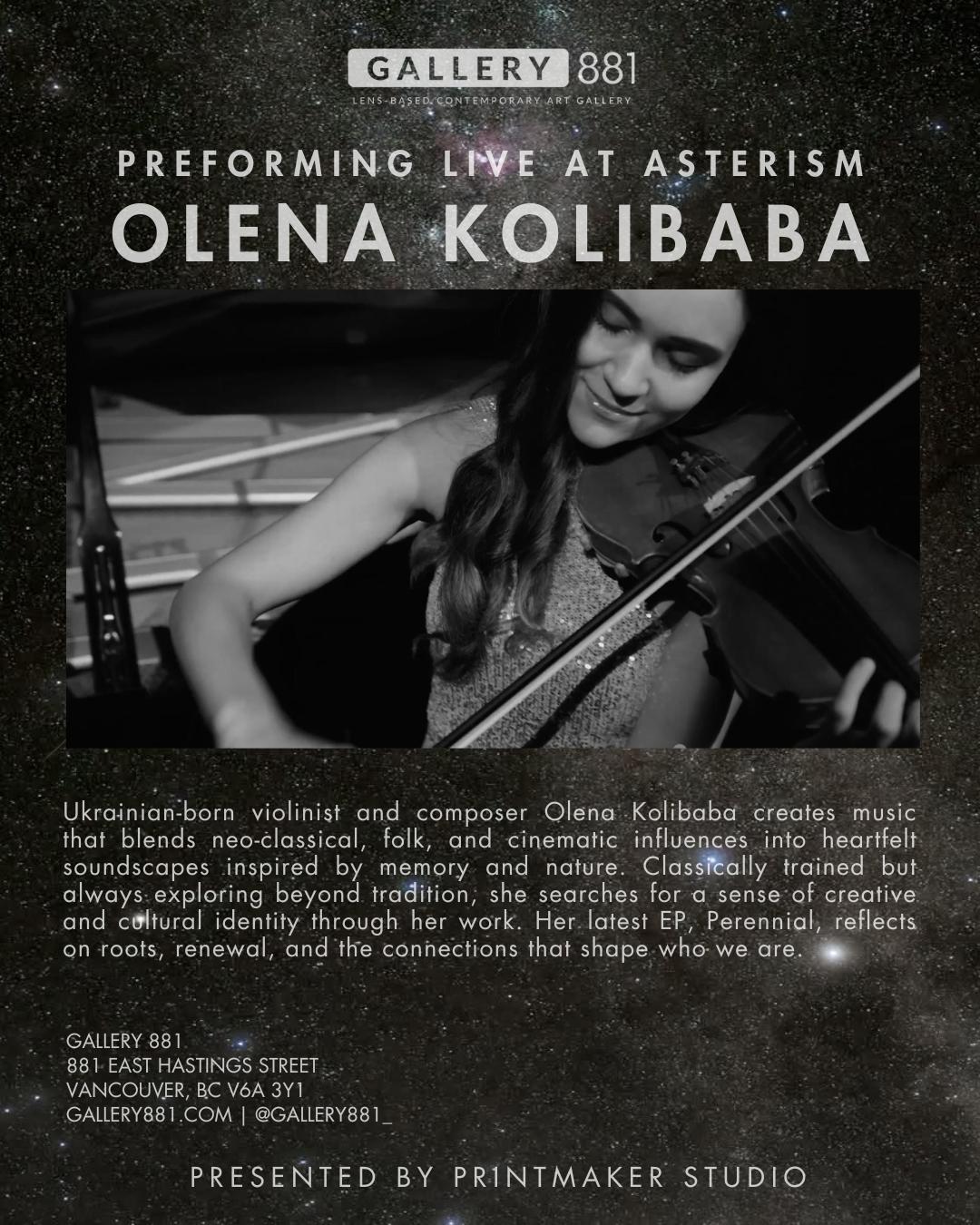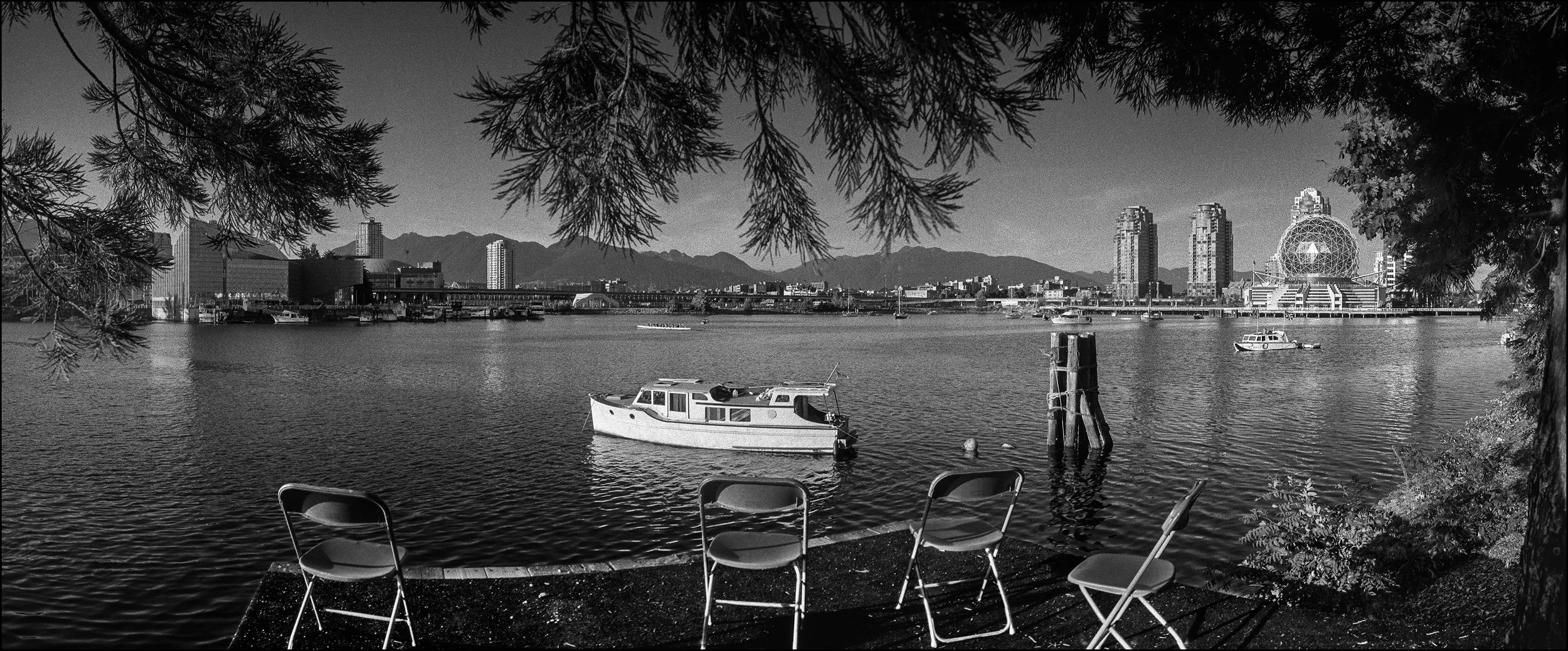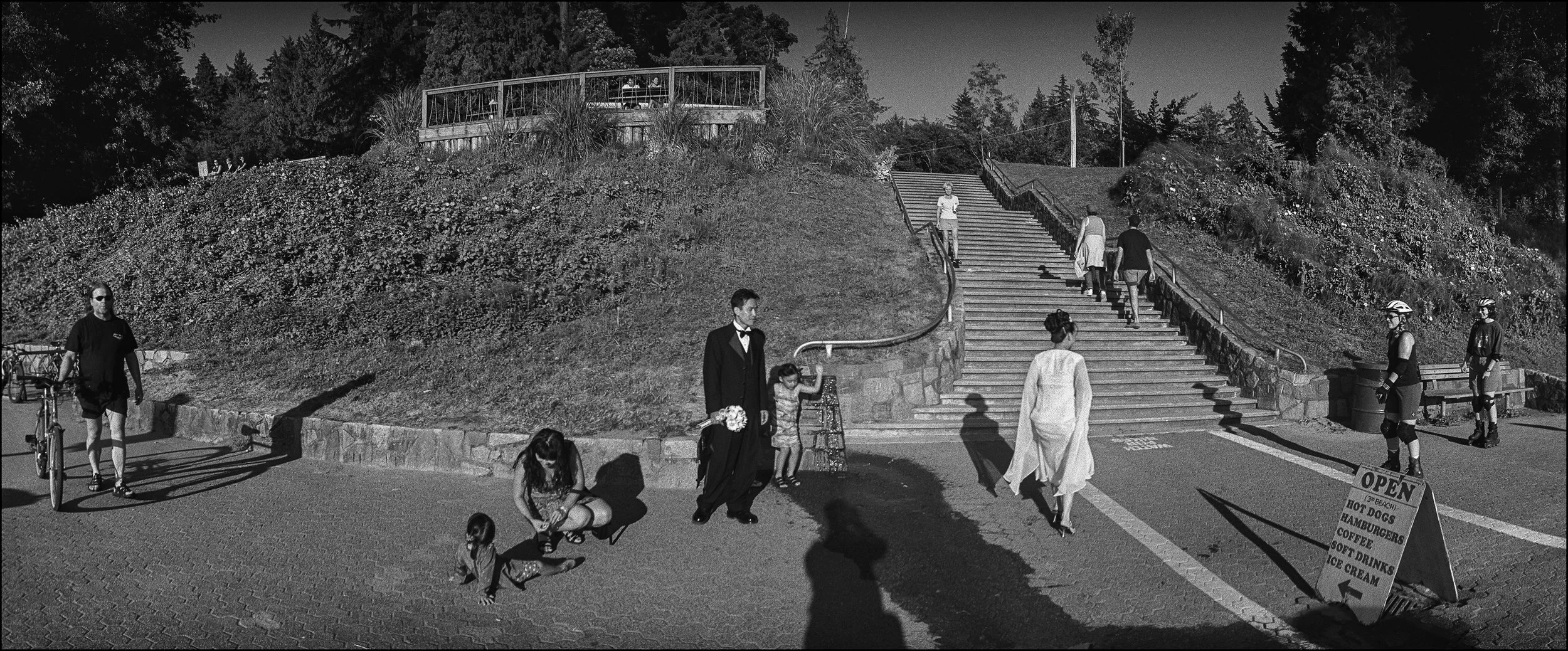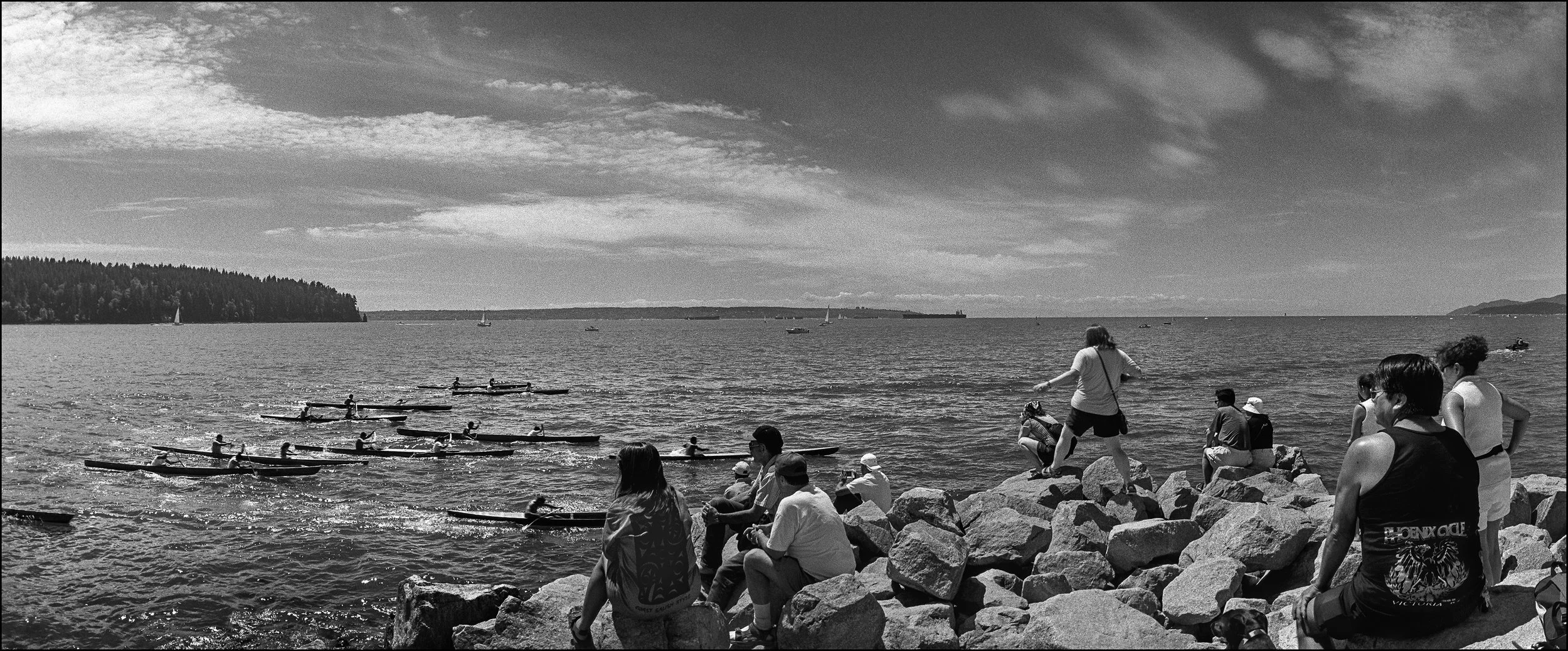EXHIBITIONS
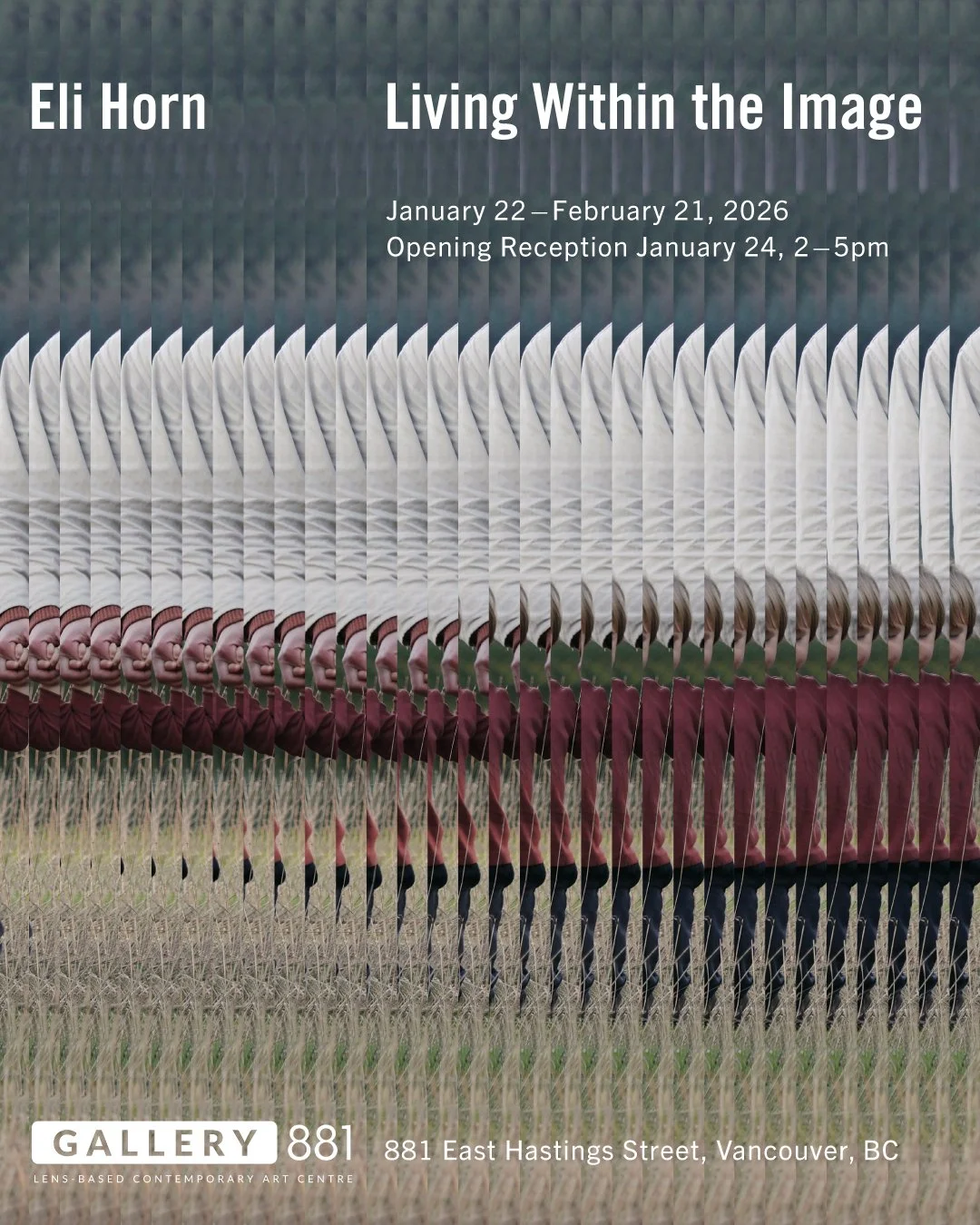
Living Within the Image by Eli Horn
EXHIBITION
January 22 - February 21, 2026
OPENING RECEPTION
Saturday, January 24, 2026, 2–5pm
We’re thrilled to open our 2026 exhibition program with Living Within the Image, featuring work by Salt Spring Island–based artist Eli Horn. On view from January 22 through February 21, 2026, the exhibition marks the beginning of a new year of exciting programming. The opening reception takes place on January 24, 2026, from 2–5pm. Gallery 881 is a free and accessible third space. Join us!
EXHIBITION STATEMENT
"An image is a stop the mind makes between uncertainties."
— Djuna Barnes
Imagination is the capacity, and the precondition, for producing and decoding symbols. Like writing, images are symbolic structures through which experience survives its immediacy and reappears, altered. Through processes of encoding and decoding, experience becomes persistent, portable, and legible, inseparable from the limits that give it form.
The works in this series explore these ideas by working at the edges of the image, through personal subject matter and in my natural surroundings. Still images are drawn toward duration, reflecting a shift in temporal register that accompanies parenthood. The path of a stream is re-encoded through the motion of the camera traversing it. The infinite novelty of ocean waves is suggested in its negation, as video approaches stillness through repetition. The past enters the present through narrow slices of scanned photographs of my childhood home.
I come to lens-based work because of how closely its images seem to reflect the world around us, how much the snapshot can feel like a persistent present. At the same time, photography’s fundamental operations point not to the world itself or to an authorial gesture, but to the shared systems through which experience is mediated. I’m interested in how these imaging systems shape what we take the world to be, rather than simply reflect it. Where does the image end?
ARTIST BIO
Eli Horn is a visual artist based on Salt Spring Island. His practice works across traditional and digital media, and through processes informed by a background in graphic design and self-taught programming. His work approaches image-making as a way of examining how experience is shaped, mediated, and carried through form. elihorn.ca
SPONSOR
Gallery 881 is proudly sponsored by our in-house PrintMaker Studio, a Canson Infinity Certified Print Lab and custom picture framer dedicated to museum-quality production. When you print or frame with our sponsor, you help sustain Gallery 881’s free exhibitions, free artist talks, free and low-entry programming, and the charitable initiatives that keep our space accessible to artists and the wider community.

Between Memory and Light by Rachel Nixon and Lorna Carmichael
EXHIBITION
February 28 - March 25, 2026
OPENING RECEPTION
Thursday, March 5, 2026, 6–9pm
EXHIBITION STATEMENT
TBA
ARTIST BIO
TBA
SPONSOR
Gallery 881 is proudly sponsored by our in-house PrintMaker Studio, a Canson Infinity Certified Print Lab and custom picture framer dedicated to museum-quality production. When you print or frame with our sponsor, you help sustain Gallery 881’s free exhibitions, free artist talks, free and low-entry programming, and the charitable initiatives that keep our space accessible to artists and the wider community.
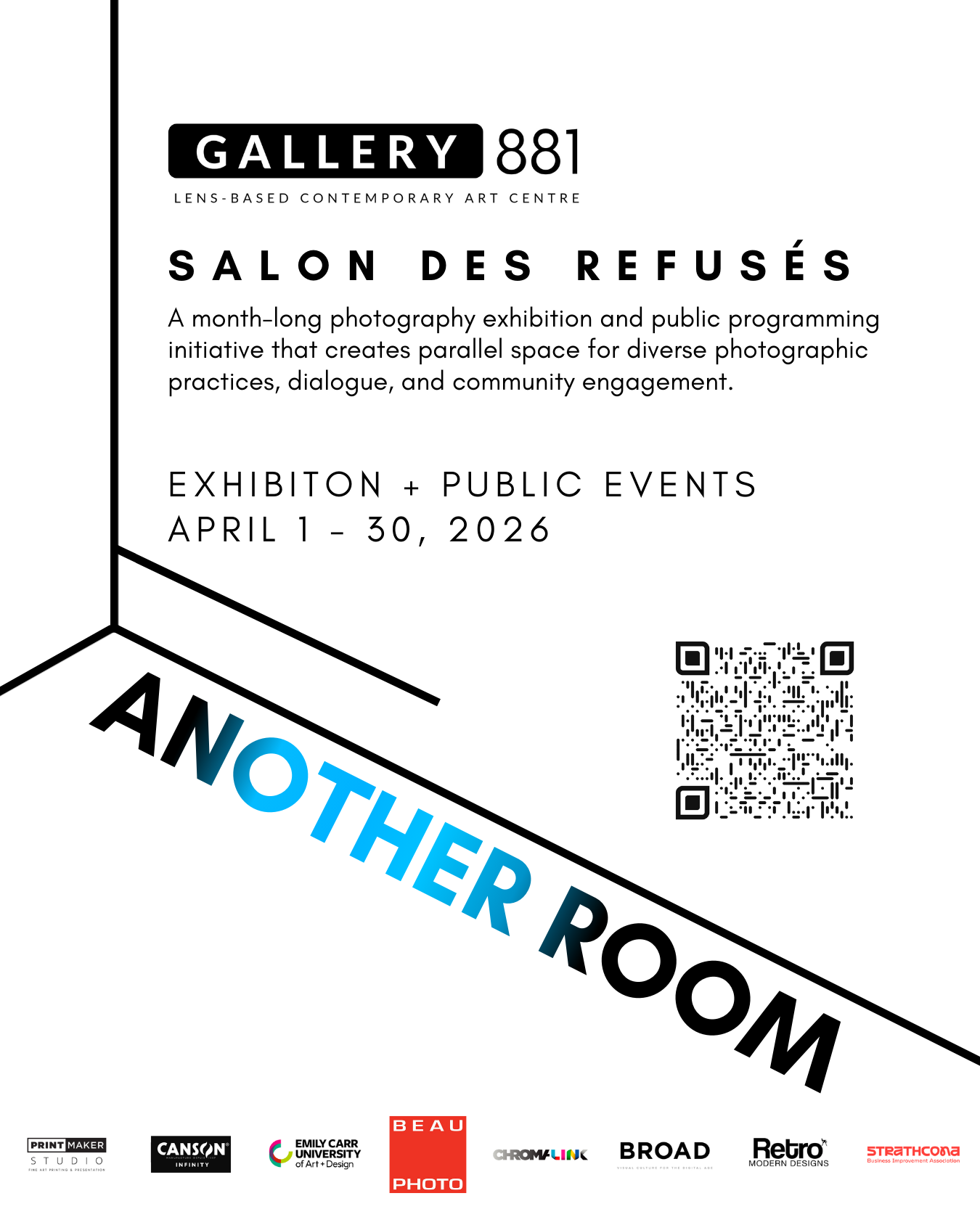
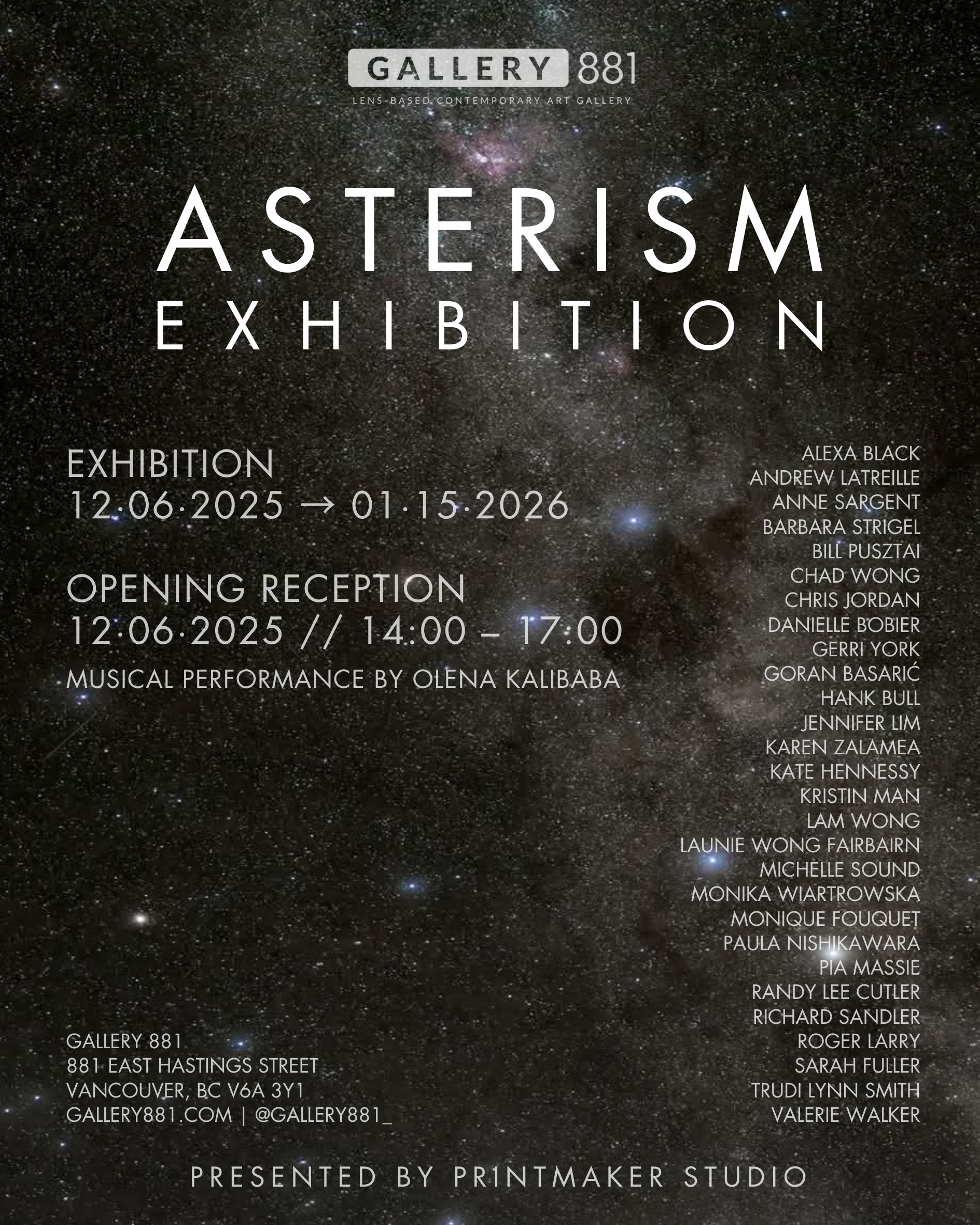
Asterism Exhibition
EXHIBITION
December 6, 2025 - January 15, 2026
OPENING RECEPTION WITH A MUSICAL PERFORMANCE BY OLENA KOLIBABA
Saturday, December 6, 2025 · 2–5pm
This December, our Asterism Exhibition invites returning Gallery 881 artists back into alignment for a vibrant Winter Salon. This special exhibition gathers familiar voices in fresh configurations to celebrate the evolving practices that continue to shape 881’s lens-based community.
Please join us on Saturday, December 6, from 2–5pm for the opening reception—an afternoon of art, perception, and reconnection as we welcome returning artists back into one shared sky.
EXHIBITION STATEMENT
“We are all star-stuff contemplating the stars.”
— Carl Sagan
In the night sky, there are 88 official constellations, each fixed by astronomical boundaries. Asterisms fall outside these definitions. They are visual structures shaped by perception — patterns we create by connecting points of light through imagination, memory, and perspective.
So too with this exhibition: each artist stands independently, but the pattern formed by their gathering is open, unfixed, and continually reinterpreted. Like the Teapot, the Winter Circle, or the Winter Triangle, Asterism invites viewers to trace their own alignments — to find meaning not in a single form, but in the shifting connections between images, materials, ideas, and the artists themselves.
At its core, Asterism considers how meaning is constructed through acts of perception. Just as an asterism emerges when scattered points of light are linked across the sky, viewers create their own patterns within this exhibition. The conceptual gesture lies not in a fixed narrative, but in the way each visitor draws relationships, tensions, and resonances between works — assembling a personal constellation shaped by memory, intuition, and attention.
Asterism gathers artists who have previously exhibited at Gallery 881 in our solo and smaller group exhibitions, forming a renewed constellation of practices that reflect the gallery’s evolving community. While Gallery 881 is grounded in lens-based practice, artists were invited to share work that reflects their current artistic direction. The exhibition brings together new and recent pieces that expand the possibilities of photographic thinking, both materially and conceptually.
Asterism celebrates this moment of reunion and renewal: a temporary gathering of voices that illuminates the breadth, depth, and possibility of lens-based art at Gallery 881.
ARTISTS
Alexa Black, Andrew Latreille, Anne Sargent, Barbara Strigel, Bill Pusztai, Chad Wong, Chris Jordan, Danielle Bobier, Gerri York, Goran Basaric, Hank Bull, Jennifer Lim, Karen Zalamea, Kate Hennessy, Kristin Man, Lam Wong, Launie Wong Fairbairn, Michelle Sound, Monika Wiartrowska, Monique Fouquet, Paula Nishikawara, Pia Massie, Randy Lee, Cutler, Richard Sandler, Roger Larry, Sarah Fuller, Trudi Lynn Smith, and Valerie d. Walker.
SPONSOR
Gallery 881 is proudly sponsored by our in-house PrintMaker Studio, a Canson Infinity Certified Print Lab and custom picture framer dedicated to museum-quality production. When you print or frame with our sponsor, you help sustain Gallery 881’s free exhibitions, free artist talks, free and low-entry programming, and the charitable initiatives that keep our space accessible to artists and the wider community.
PERFORMING LIVE AT THE ASTERISM OPENING RECEPTION IS OLENA KOLIBABAO
We’re thrilled to welcome a live musical performance at the opening reception of Asterism by Ukrainian-born violinist and composer Olena Kolibaba (@olena_kolibaba). Join us!
Ukrainian-born violinist and composer Olena Kolibaba creates music that blends neo-classical, folk, and cinematic influences into heartfelt soundscapes inspired by memory and nature. Classically trained but always exploring beyond tradition, she searches for a sense of creative and cultural identity through her work. Her latest EP, Perennial, reflects on roots, renewal, and the connections that shape who we are.
Follow Olena on Instagram at @olena_kolibaba and on Bandcamp and Spotify.
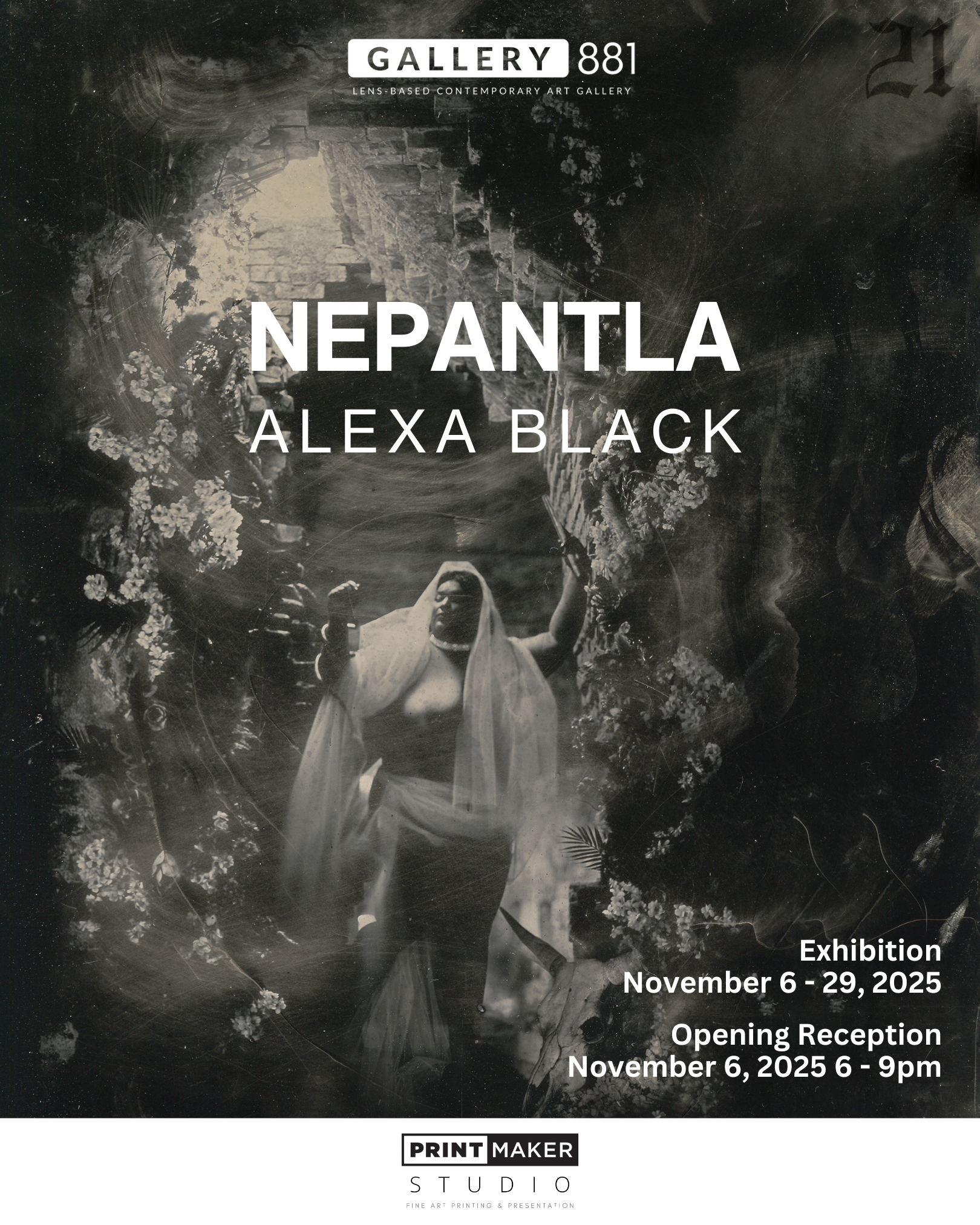
Alexa Black: NEPANTLA Exhibition
EXHIBITION STATEMENT
NEPANTLA is an 80-image body of work created through the historic process of wet plate photography, exploring identity, power, and transformation through the ritual art of cartomancy. Inspired by queer Chicana feminist theorist Gloria Anzaldúa, Nepantla refers to the in-between space inhabited by those who embody multiple, intersecting identities—such as being mixed-race or gender queer—where constant transition cultivates a deep tolerance for contradiction.
Layered with the feminist theory of Kyriarchy, which maps shifting dynamics of power and oppression, the work examines how we relate to ourselves and one another within complex social and cultural systems. Through ceremonial imagery and symbolic language, NEPANTLA becomes a space of healing—reconnecting fragmented identities and invoking a sense of wholeness within the flesh.
This project stands as both reflection and reclamation, offering new pathways for embodied existence, spiritual reconnection, and collective transformation.
ARTIST BIO
Alexa Black is a multidisciplinary artist of Nahua, Maya, and Irish heritage, creating as a guest on the traditional, ancestral, and unceded territories of the Coast Salish peoples, including the Xwməθkwəyə̓’m (Musqueam), Skwxwú7mesh (Squamish), and Səílwətaʔ/Selilwitulh (Tsleil-Waututh) Nations.
Alexa’s work spans small- and large-format photography, graphite, and charcoal drawing, each serving as a medium to reveal the magic of unseen realms that exist beyond terrestrial and colonially defined boundaries. Her creative process is deeply rooted in the energies of her Indigenous ancestral territories, an animistic understanding of interconnectedness, and the transformative power of conscious healing.
In her recent body of work, Alexa delves into the reconciliation of fractured identities, reclaiming and amplifying the silenced voices of her matrilineal ancestors. Her art bridges past and present, weaving together lineage, memory, and spirit in a reclamation of cultural and personal histories.
A dedicated photographer since the age of 16, Alexa discovered her passion for the wet plate collodion process in 2015, sparking a profound connection to the alchemy of analog photography. She honed her drawing skills in 2022 through a nine-month sponsorship at the Barcelona Academy of Art. In 2023, she elevated her wet plate practice to crafting mammoth plates under the mentorship of acclaimed photographer, John Coffer.
Through her evocative work, Alexa invites viewers into liminal spaces where identity, memory, and ancestral reverence converge, offering a timeless exploration of connection, resilience, and transformation.
Gallery 881 is sponsored by our in-house PrintMaker Studio, a Canson Infinity Certified Print Lab and Custom Picture Framer. Alexa Black’s artwork was framed in-house. To acquire artwork, please contact the gallery directly.
GALLERY 881
881 East Hastings Street
Vancouver, BC
Canada V6A 3Y1
gallery881.com
@gallery881_
NEPANTLA
by Alexa Black
Exhibition
November 6 - November 29, 2025
Opening Reception
Thursday, November 6, 2025 from 6 - 9pm
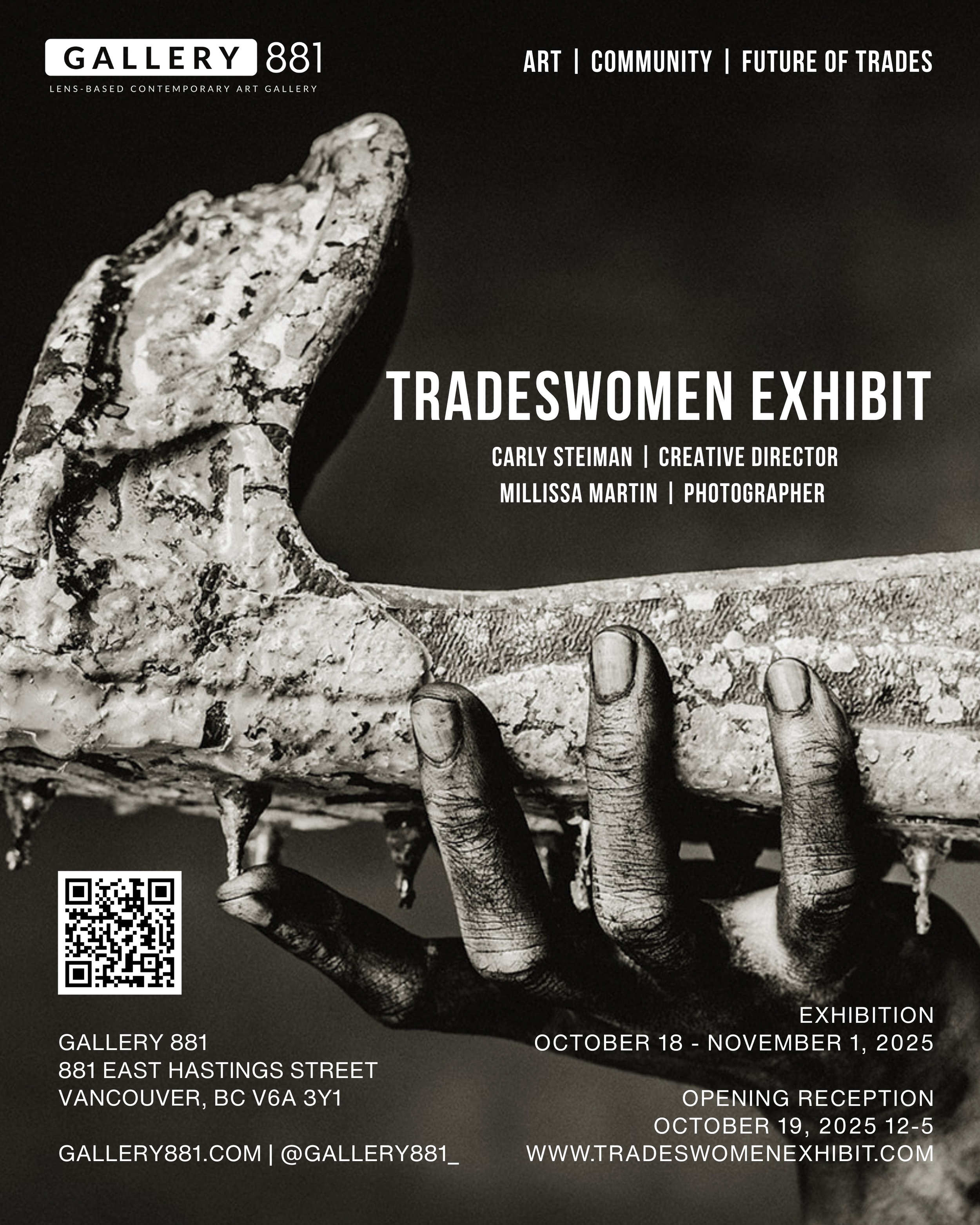
Tradeswomen by Carly Steiman and Millissa Martin
Gallery 881 is proud to present The Tradeswomen Exhibit by Vancouver-based collaborators Carly Steiman and Millissa Martin. Bringing together portraiture and documentary photography, the exhibition celebrates the strength, skill, and artistry of women working in the trades, those whose hands and labor shape the spaces in which we live and work.
Through intimate images of faces and hands at work, The Tradeswomen Exhibit elevates stories too often overlooked. Tools become extensions of identity, gestures reveal decades of mastery, and each portrait honors not just craft, but courage and persistence in a field historically dominated by men.
Rooted in Carly’s lived experience as a Red Seal Electrician with nearly two decades in the trades, and Millissa’s photographic practice grounded in human connection, the exhibition weaves labor, identity, and artistry into a shared narrative. What began as a vision for a tradeswomen’s calendar has evolved into a cultural activation: an exhibition that challenges stereotypes, sparks conversation, and offers new possibilities for how we value work, equity, and community.
Gallery 881 is sponsored by our in-house PrintMaker Studio, a Canson Infinity Certified Print Lab and Custom Picture Framer. Visit tradeswomenexhibit.com for more information, support women in trades, and get your very own Tradeswomen Calendar.
GALLERY 881
881 East Hastings Street
Vancouver, BC
Canada V6A 3Y1
gallery881.com
@gallery881_
TRADESWOMEN
by Carly Steiman and Millissa Martin
EXHIBITION
October 18 - November 1, 2025
OPENING RECEPTION
Sunday, October 19, 2025 from 12 - 5pm
EXHIBITION STATEMENT
The Tradeswomen Exhibit is a celebration of womens’ skill, determination, and curiosity that shape the spaces we live in. Through intimate portraiture and striking images of hands at work, this exhibition brings forward the overlooked contributions of tradeswomen and challenges outdated notions of gender in construction and home services.
Each photograph reveals both strength and subtlety: weathered hands gripping tools with precision, faces radiating determination and quiet pride. These are not only portraits, but testaments to lives built through labor, artistry, and courage.
Blending Carly’s lived experience as a Red Seal Electrician with nearly two decades in the trades, and Millissa’s photographic storytelling that captures human essence, the exhibit honors and celebrates women. Together, they create a visual dialogue that connects identity, labor, and artistry - inviting viewers to recognize the power embedded in every detail.
At its core, the Tradeswomen Exhibit is more than an art installation-it is an activation of culture, sparking curiosity, conversation, and connection.
ARTIST BIO: Carly Steiman
Carly Steiman is a Red Seal electrician, entrepreneur, lighting consultant, and community builder based in Vancouver, BC. With over seventeen years in the electrical trade, she has cultivated a reputation for combining technical expertise with storytelling that elevates the voices of tradespeople working in residential construction and service industries.
Her career spans film, television, and construction sites, where she has been recognized as both a master of light and a strong advocate for inclusivity in the trades. Carly was the only Canadian woman competitor on the CBS reality series
Tough as Nails, and she continues to speak publicly about curiosity, leadership, and equity in skilled labor. Her love of storytelling stems from her connection with elders – listening to their lives and learning from their hands. Seeing gaps in resources for aging-in-place communities, Carly has carried this same instinct into her work beyond the gallery, piloting a home services agency to ensure dignity, care, and connection at home.
Both her artistic and entrepreneurial projects are bound by a desire to fix what is missing, to amplify overlooked voices, and to honor the stories of people whose hands have built and sustained our world. Her work has been featured at industry conferences, community events, and through collaborations with artists, organizations, and galleries. Through each project, Carly weaves together her values of kindness, curiosity, and empowerment-bringing light to spaces, stories, and people too often overlooked.
ARTIST BIO: Mellissa Martin
Millissa Martin is a Vancouver-based photographer whose practice blends fine art portraiture with documentary storytelling. With a keen eye for detail and a sensitivity to human connection, her work captures quiet strength and raw authenticity. Millissa has photographed a wide range of subjects, but her focus often returns to themes of identity, resilience, and belonging. Her ability to frame both the artistry and grit of her subjects makes her an ideal collaborator for projects that honor lived experience and community narratives.
Friendship & Origin Story
The Tradeswomen Exhibit is rooted in both history and friendship. Back in 2011, Carly drafted a storyboard for a project that would one day celebrate women in the trades. Life and work pulled her in other directions, and the idea was set aside.
A decade later, while launching a new business, she revisited that vision with the idea of producing a tradeswomen’s calendar. When Carly and Millissa came together-friends with a shared passion for storytelling, movement and representation-the concept quickly expanded.
What began as a calendar evolved into something larger: an exhibition that merges art and advocacy, giving tradeswomen visibility and voice. Through Millissa’s lens and Carly’s lived experience in the trades, the project grew into a cultural activation-one that not only honors craft but also challenges stereotypes and sparks conversation about the future of work, what’s possible and inviting our community inside to learn.
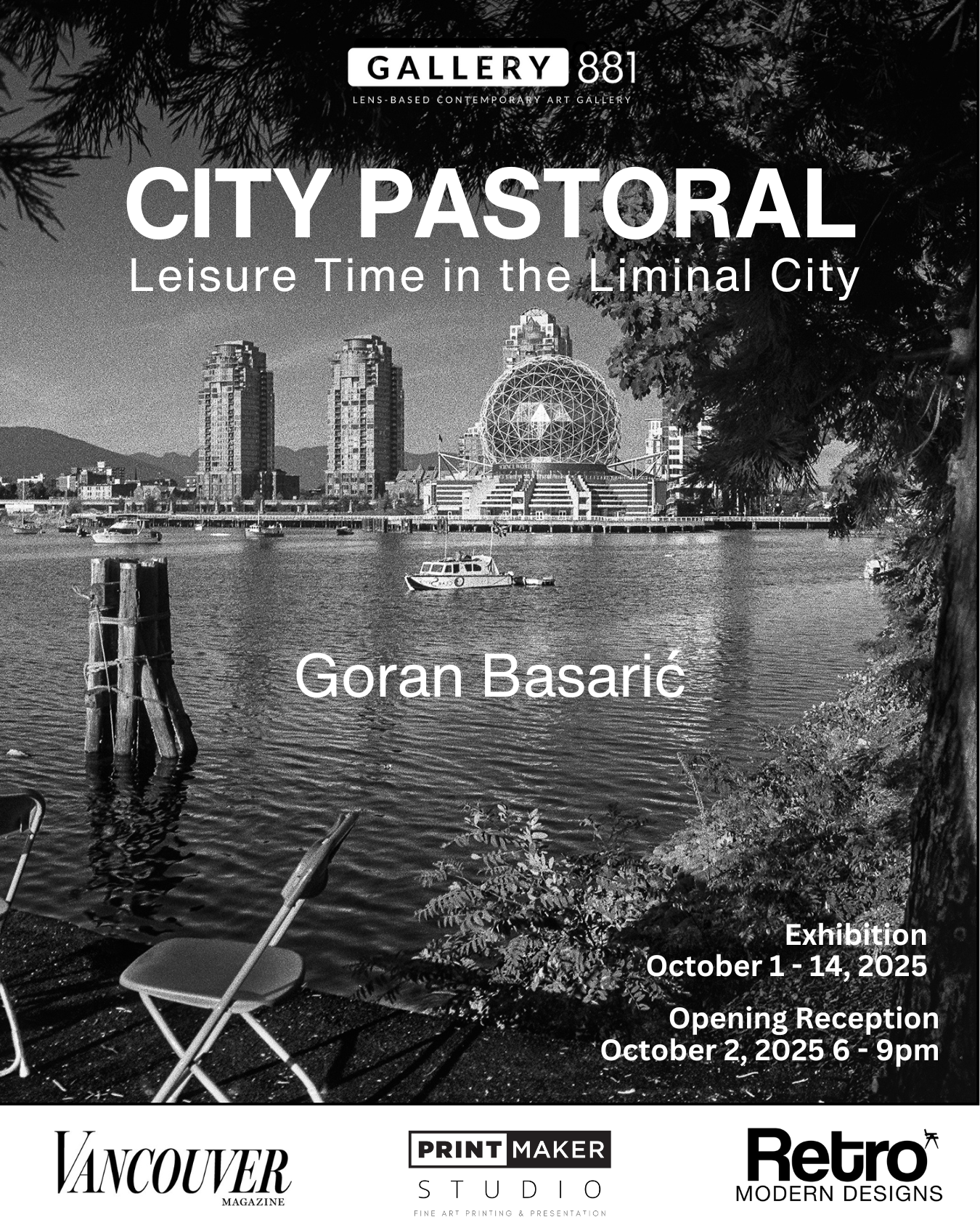
Goran Basarić: City Pastoral: Leisure Time in the Liminal City Exhibition
Gallery 881 is excited to present City Pastoral: Leisure Time in the Liminal City by Vancouver-based photographer and cinematographer Goran Basarić, on view October 1–14, 2025. With a filmmaker’s eye, Basarić transforms Vancouver’s coastline into a panoramic narrative of leisure, ritual, and place.
Along the razor-thin boundary of Vancouver’s historic seawall, the threshold where city meets ocean, Basarić’s panoramic photographs transform this passage into a stage for everyday life. Known as the “Terminal City,” Vancouver is reimagined here at its very margin, where land slips into the Pacific.
Begun more than three decades ago and continuing to this day, City Pastoral captures an ever-evolving portrait of life along the city’s shoreline. With his vintage Soviet Horizont analog camera, Basarić renders leisure as “extravagant normalcy,” revealing the poetic tension between urban habit and expansive horizon.
The exhibition includes 11 finished works printed on Canson Infinity Platine Fibre Rag (310 gsm) with panoramic photographs taken between 2000 and 2024. Seen together, they affirm Basarić’s ongoing vision: to capture the fleeting yet enduring rhythms of life along Vancouver’s liminal threshold—a collective playground where the city meets the sea.
Gallery 881 is sponsored by our in-house PrintMaker Studio, a Canson Infinity Certified Print Lab and Custom Picture Framer. We are grateful to Vancouver Magazine for sponsoring the City Pastoral exhibition.
GALLERY 881
881 East Hastings Street
Vancouver, BC
Canada V6A 3Y1
gallery881.com
@gallery881_
CITY PASTORAL: LEISURE TIME IN THE LIMINAL CITY
by Goran Basarić
Exhibition
October 1 - October 14, 2025
Opening Reception
Thursday, October 2, 2025 from 6 - 9pm
Artist Talk & Tour with Photowalk
Saturday, October 11, 2025 Noon til Onward
In collaboration with Beau Photo. Meet at Gallery 881 at noon!
Before sunset, False creek (2002). Image courtesy of Goran Basarić.
EXHIBITION STATEMENT
There is a sublime quiet that falls upon a scene like Goran Basarić’s Ferry Heading Out—a slow roll of beauty that moves through the frame as sturdily and as gently as the small passenger ferry put-putting its way west. In the distance, rain clouds loom large over this last long stretch of Vancouver, but no matter. Nothing is going to get in the way of wherever this determined vessel is going. Such an intrepid spirit marks many of the scenes in Basarić’s cinematic-style panoramic photographs included in the collection, City Pastoral. But he didn’t start off seeing this way, which may be part of Basarić’s advantage for picturing this Pacific city the way he does.
Basarić was born in an older version of Belgrade, and came of age as the sun was setting on Tito’s liberal period of independent socialism and Yugoslavia’s political middle way. By the 1990s, market restrictions and ethnic rivalries would break the country, but for this moment, youth-struck, Basarić lived in his own creative paradise. He did his degree in Cinematography at Belgrade’s prestigious Faculty of Dramatic Arts under the influence of a new generation of directors dealing more openly with the diminishing stature of their fragile country. Change was picking up speed. There was still inspiration at the center but trouble was crowding the edge of the frame.
In an early series of photographs, Restaurant FDU, Basarić put his camera in the thick of his generation’s cafeteria, or coffeehouse, scene. The photographs are shot in dirty blacks and ashtray greys and are lit like an interrogation room in a film-noir movie. In the gloom, cigarettes are waved about like weapons as the students talk darkly of their dreams. The mood of the pictures manages to match the mood in these rooms. Already Basarić was gaining hold of his camera and making his style be part of the story.
Mindful of the documentary photography tradition of the great Magnum photographers, Basarić took to the streets for inspiration. Bresson’s smart-eye strategy for the “decisive moment,” when serendipity strikes gold, led him to pan and scan many of Belgrade’s crowded streets, but little stood out for him. The light was dull and he felt too closed in by the past. It would take an old camera and a new city to let his talent break free.
All of Basarić’s panoramic photographs in this collection show the full stretch of vision he’s able to achieve with his Horizont camera. Dating to the Soviet Union in the 1960s, the Horizont is an all-metal mechanical swing-lens panoramic camera. It is similar to the Japanese Widelux, but the Horizont, being of Soviet vintage, is a little more capricious in its working. You never know what will turn up in the frame by the time the shot is done. Basarić has come to rely on the built-in unpredictability of the Horizont.
He has used the Horizont to greatest effect in the wide open spaces of his adopted city of Vancouver, an idyllic spot nestled between mountains and water. The panoramic frame commands attention in the same manner as does a stage. Against the draping natural beauty of this setting, fickle actors set out in play.
But this is theatre of the ordinary and everyday. Basarić has a sure touch for putting Canadians in their proper place. Just like it took the Swiss-born Robert Frank to make an American look like an American, it takes an expatriate Serbian to let Canadians play by their own rules.
And what of this place he calls City Pastoral? The scenes may be poetic but they’re not soft; there is a lyrical rhythm to Basarić’s photographs that feels very solid and keenly observed. As meditations on the nature of social environments, certainly the term “pastoral” should be taken in stride. These are 21st-century urban Canadians going about their business, not country gentlemen lolling about in a Constable painting. Leisure rarely looked less leisurely. In the quick of these passing moments, Basarić captures the peaceable freedom possible in these public spaces. Basarić refers to the “extravagant normalcy” of these scenes and that idea hits the mark. In all these quotidian places, he makes the commonplace appear compelling.
Basarić’s collection has many charms. The formal bride coming up the long sweep of sandy beach stairs is a decidedly West Coast version of elegant. The shirtless boys riding the back of the BC Ferry, dumbstruck by sunshine and grandeur. The bicyclist balanced between land and ocean, casually needling his way through the surf. Everyone rises a little above themselves to meet the challenge of these monumental spaces. And then slipping in among all the long shadows is Basarić himself—the lucky participant who, by chance and determination, put himself in the right place at the right time.
ARTIST BIO
Goran Basarić was born in Yugoslavia in 1962, and took his degree in Cinematography from Belgrade’s prestigious Faculty of Dramatic Arts. His career since has spanned a range of positions including photojournalist, picture editor, adjunct professor, and independent cinematographer. In 1994, Basarić emigrated to Vancouver, Canada, where he has built a successful career in the city’s film industry.
Through this time, Basarić has developed a succession of photographic essays that give poetic value to his keen understanding of how people reveal themselves in light and space. His work is known for both its scale and intimacy. All of Basarić’s photographs are marked by his respect for the discipline of the “decisive moment” and the tradition of street photography exemplified by Bresson, Doisneau, and the great Magnum photographers.
Basarić’s photographic collections have been exhibited in both Canada and Europe. His first exhibition, Kafana, opened as a solo show at the Happy Gallery in Belgrade in 1987. His exhibition Big Wave – Radio B92 was featured in Vancouver, Belgrade, and the Netherland’s Photo Institute in Rotterdam. Basarić’s work was also featured in group shows at the Imperial War Museum and Bishops Gallery in London, UK.
Basarić’s City Pastoral is an ongoing collection of panoramic photographs that act as lyrical meditations on the value of public space in his adopted city of Vancouver. The work has been exhibited and published in series form. City Pastoral was originally published as a feature photo narrative in Geist, a respected literary publication distributed throughout North America. The series has also been published in Re-Foto Magazine. City Pastoral debuted in exhibition form at the Roundhouse Gallery in Vancouver in 2011 as part of the city’s Memory Festival, and the show has since travelled to Gallery Artget in Belgrade.
Also in 2011, Basarić was invited to be part of Hjem. Dom. Home., a group show on the value of place and identity sponsored by Copenhagen’s Kulturstationen.
Goran Basarić lives with his wife and son in Vancouver, B.C.
Image courtesy of Goran Basarić.
Excerpt From Geist Magazine (2004)
When Goran Basarić first encountered the public spaces of Vancouver (in 1994, when he emigrated from Yugoslavia with his wife), he remembered the pictures he used to look at on the trains that took him to the Adriatic coast of Yugoslavia when he was a child, and every year his parents would send him with other skinny kids (as he tells it) to summer camp, where his health would be improved by the salubrious coastal air. The train left Belgrade in the evening, so it was dark outside, and the photographs on the walls of the coaches were the only thing to look at. They were black-and-white scenic views of resorts and tourist destinations: seascapes, castles, monuments and forts, and they had deep skies filled with billowing white clouds; in the morning he would awaken to the smell of the seaside and the coastal vegetation and the low warm sun burning in from the east.
It was a magical time, and he was recalled to it by a certain extravagance of the scene in Vancouver when he went with his infant son to walk in the parks in the late afternoon; he could feel the nearness of the ocean of that time long ago, and a sense of a slightly ludicrous juxtaposition of the two coastal places.He was a photographer, and so it was natural for him to consider the appearances that put him in such a mindful state: the wide-angle spread of foliage and low sky, the great embrace of late-day shadows in the northern light (an embrace in which his own silhouette was to be found, outlined in light), and the autonomous demeanour of the people who inhabit or rather are to be seen passing through those spaces: wedding couples, skateboarders, cyclists, runners, strollers, teenagers and children: all more or less oblivious to each other, acting out their leisure scripts in worlds of their own. - Mandelbrot
“City Pastoral – Public Photography”
Photo Narrative, Geist Magazine, 2004
Image courtesy of Goran Basarić.




